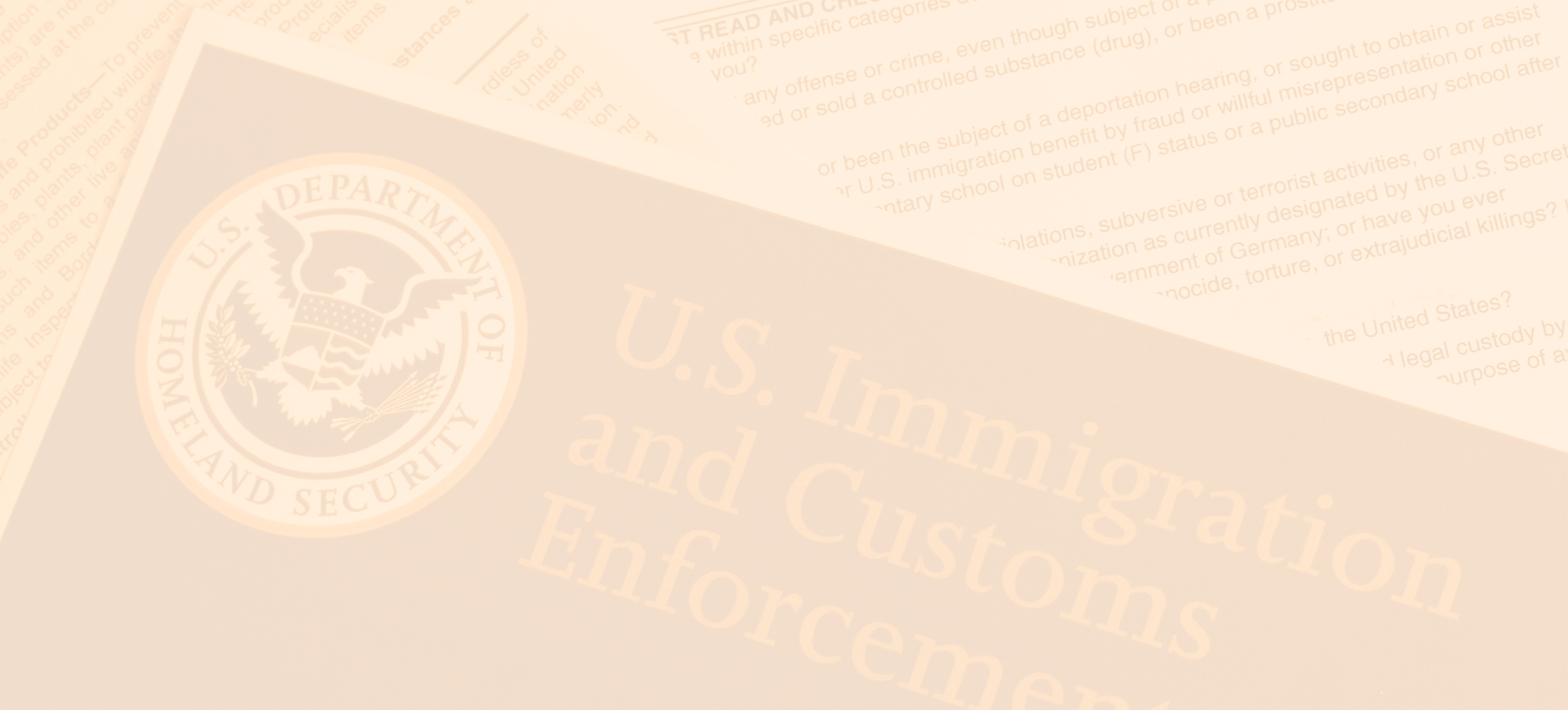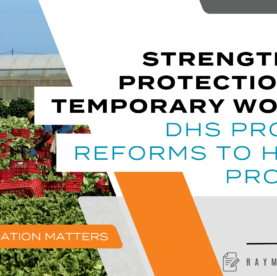Aliens seeking admission to the United States (U.S.) as immigrants follow one of two paths depending on their residence at the time of application.
Aliens living abroad apply for an immigrant visa at a consular office of the Department of State. Once issued a visa, they may enter the U.S. and become legal immigrants when they pass through the port of entry.
Aliens already living in the U.S., including certain undocumented immigrants, temporary workers, foreign students, and refugees, file an application for adjustment of status (to legal permanent residence) with the Bureau of U.S. Citizenship and Immigration Services (USCIS). At the time they apply for adjustment of status, applicants may also apply for work permits. New legal immigrants are automatically authorized to work and should receive alien registration cards (“green cards”) after becoming legal permanent residents.
Lahoud Law is the leading Immigration and Deportation Defense Firm in Pennsylvania, providing services for the full range of immigrant visas – family and employment based.
Immigrant Visa Categories
Immigrant visas may be divided into two categories: visas subject to numerical limitations and those that are not.
Visas not subject to numerical limitations are granted to immediate relatives (children, parents and spouses) of U.S. citizens, resident aliens returning from temporary visits abroad, and former U.S. citizens. To qualify as a “child” of a U.S. citizen the person must be unmarried, under 21 years old, and either a legitimate child, stepchild, illegitimate child, adopted child, an orphan adopted abroad, or an orphan coming to the U.S. to be adopted. A parent with any of the relationships described under the definition of child qualifies as a “parent.” In order to receive a visa as the spouse of a U.S. citizen the alien must have a “valid and subsisting marriage” with that citizen.
Visas subject to numerical limitations are granted to persons qualifying for family sponsored, employment related, or diversity immigrant visas. There are four categories of family sponsored visa preferences: unmarried sons and daughters of U.S. citizens and their children; spouses, children, and unmarried sons and daughters of legal permanent residents; married sons and daughters of U.S. citizens and their spouses and children; and brothers and sisters, including spouses and children, of U.S. citizens ages 21 and over. There are five categories of employment-sponsored preferences: priority workers; professionals with advanced degrees or aliens of exceptional ability; skilled workers, professionals (without advanced degrees), and needed unskilled workers; special immigrants (e.g. ministers, religious workers, and employees of the U.S. government abroad); and employment creation immigrants or investors.
As noted, one can secure an immigrant visa through either a family petition or an employment based petition.
Family Sponsored Immigrant Visas
| Classification | Individuals Included |
|---|---|
| Immediate Relatives Immediate Visas Available | Spouses of US citizens (USCs), unmarried children under 21 years of age of USCs, and parents of USCs. For children to sponsor their parents, the child must be over the age of 21. Falling into this category provides for an immediate visa classification and, if all documents are properly filed, will lead to the issuance of a Lawful Permanent Resident Card (known also as a “Green Card”). |
| First Preference | Unmarried sons or daughters over 21 years of age of USC. |
| Second Preference | Spouses and children of Legal Permanent Resident, or LPR. |
| Third Preference | Married children of USC. |
| Fourth Preference | Siblings of adult USC. |
Employer-Sponsored
| Classification | Individuals Included |
|---|---|
| First Preference Priority Workers E1 or EB-1 | Individuals with extraordinary ability in the sciences, arts, education, business or athletics. Also includes outstanding professors or researchers and managers and executives subject to international transfer to the United States. |
| Second Preference Advanced Degrees E2 or EB-2 | Individuals with exceptional ability in the sciences, arts or business, professionals holding advanced degrees (PhD, MD, MS, MA, JD, etc.), physicians who will practice medicine in an area of the U.S. which is underserved and those eligible under the National Interest Waiver. |
| Third Preference Skilled Workers E3 or EB-3 | Professionals with bachelor’s degrees (not qualifying for a higher preference category), skilled workers (requires a minimum two years training and/or experience in the field of employment) and other certain workers (where less than two years of training and/or experience is required). |
| Fourth Preference Certain Special Immigrants E4 or EB-4 | Includes clergy and certain non-clergy religious workers for recognized religious organizations, foreign medical graduates living and practicing in the U.S. since January 9, 1978, commuters from the border, translators with the U.S. Armed Forces, certain diplomats, certain Department of State foreign employees, etc. |
| Investor Visa E5 or EB-5 | For Certain Investors – Please See Discussion in the Investor Visa Below. |
Family and Employment-Sponsored Applications
Applying for family-sponsored immigrant status is a multi-step process involving numerous submissions. First, the USCIS must approve an immigrant visa petition filed by a relative and accompanied by proof of relationship to the requesting relative. Second, the Department of State must determine if an immigrant visa number is immediately available to the alien, even if he or she is already in the U.S. Third, if the alien is already in the U.S., he or she must apply to change his or her status to that of a lawful permanent resident after a visa number becomes available. If the alien is outside the U.S. when an immigrant visa number becomes available, he or she must then go to the U.S. consulate to complete processing. Applying for employment-sponsored immigrant status requires a similar multi-step process, with the added requirement that the employer must file a labor certification request with the U.S. Department of Labor.
Family sponsored and employment related immigrant visas are subject to a complicated system of per-country numerical caps. The U.S. Department of State, Bureau of Consular Affairs, publishes a monthly Visa Bulletin that summarizes the availability of visas subject to numerical limitations, and lists the countries that have filled their allotments.
Investor Visa – The E5 or EB-5 (Employment Fifth Preference)
Each year, hundreds of thousands of employment-based immigrant visas are made available to applicants across the globe. Many enter through employer sponsorship. Others, however, recognizing the economic opportunities available in the United States and with investment capital under their control choose to relocate to the United States and start or purchase a company. In doing so, an individual who wishes to immigrate to the United States must make a minimum investment and meet certain other requirements.
The United States welcomes individuals from across the globe to invest in this country and, if investing, to immigrate to the United States, so as to manage the company or enterprise that the foreign national (potential immigrant) creates and operates.
Applicants for the immigrant investor visa must meet several requirements. First, the foreign investor must invest $1,000,000 (US Dollars) in capital in a commercial enterprise. If, however, the foreign investor decides to operate the new corporation in an area that is considered a targeted employment area, then the minimum investment is $500,000 (US Dollars).
Second, the investor must create at least ten full-time jobs for Citizens, Lawful Permanent Residents or others permitted to work in the United States. The actual investor or the investor’s spouse or children cannot count towards the ten required jobs.
The Investor Visa program will, if approved, result in the issuance of a Lawful Permanent Resident Card (Green Card). The investor’s spouse and children (if under a certain age) can immigrant with the investor to the United States. The process is complex and requires a substantial amount of documentation that should not be navigated alone. An experienced Attorney should be contacted to discuss the possibility of one’s application for the Investor Visa.
Diversity Lottery
The diversity immigration program provides another, but more limited, method of gaining permanent residence. Under this program, approximately 55,000 immigrant visas are available annually to aliens who are natives of countries determined by USCIS to be “low admission” countries, that is, countries that are proportionately under-represented in the U.S. immigrant population. To receive a diversity visa, an individual must have at least a high school education or its equivalent, or, within the preceding five years, two years of work experience in an occupation requiring at least two years training or experience.




